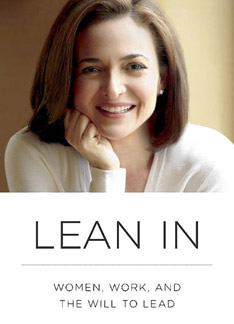'Leaning In' to Sheryl Sandberg's Book
 I wish Sheryl Sandberg’s book “Lean In: Women, Work, and the Will to Lead” was published when I was fresh out of college.
I wish Sheryl Sandberg’s book “Lean In: Women, Work, and the Will to Lead” was published when I was fresh out of college.
While some praise Sandberg’s book as empowering for women, others don’t appreciate her crafting the message that women have themselves to blame for holding back, or not “leaning in.” Surrounded by a lot of noises from the media and anyone with an opinion, I decided that instead of focusing on Sandberg’s controversial point-of-view, my objective should be to learn from Sandberg and other powerful women mentioned in the book. In the end, I enjoyed it and did learn many valuable lessons. To me, “Lean In” is not just about gender biases in the workplace, but it is an essential guide to navigate a successful career. As I continue to grow in my profession, any pointer to help better myself, or anecdotal story that inspires and motivates is much appreciated. And to me, “Lean In” meets that expectation.
Here are a few points that resonated with me:
- Grab a seat on a rocket ship. This was the advice that Sandberg received from Eric Schmidt, former CEO of Google, when she couldn’t decide whether or not to accept the position at this relatively unknown company at the time. Potential growth is all that matters, which is essentially Schmidt’s advice to Sandberg.
- Climb the jungle gym, not the ladder. Climbing the corporate ladder has been a common metaphor for advancing one’s career. According to Sandberg, and I agree, that this concept is restrictive. A ladder offers only two career directions – up or down – while a jungle gym offers many career paths that still take you to the top. If this is the new career mindset, what should organizations do to offer a jungle gym, instead of a ladder, in order to retain the best talent?
- You don’t need a mentor because you are surrounded by many. Think of your colleagues whom you can ask for work-related help. Or, your former colleagues whom you can turn to for career decisions. What about your parents, siblings, and friends who are always there for you when you needed someone with a clearer judgment than your own? They don’t have the title of a mentor, but they do play the role of one.
The book has a lot more interesting tidbits, albeit controversial. Overall, I think this is an essential read for any working professionals, especially those just starting out. If I could, I would ship a copy to my 21-year-old self. ![]()
